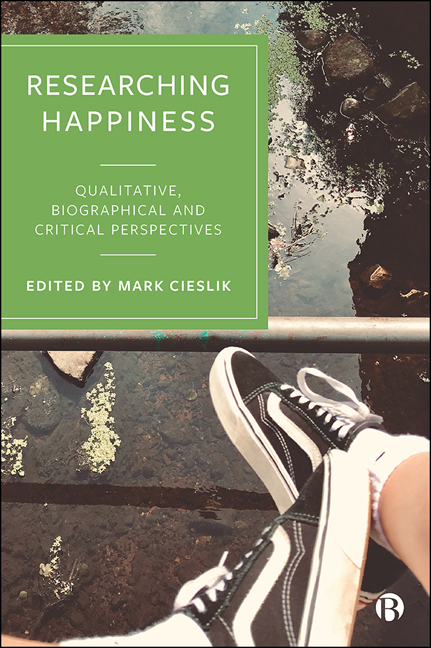Book contents
- Frontmatter
- Contents
- List of Figures and Tables
- Notes on Authors
- 1 Introduction: Developing Qualitative Research into Happiness and Wellbeing
- Part I Qualitative Research into Happiness/Wellbeing: Theories, Debates and Issues
- Part II Qualitative Research into Happiness/Wellbeing: Communities, Biographies and Identities
- Part III Qualitative Research into Happiness/Wellbeing: Methodological Innovations
- Index
2 - Living Well Together: On Happiness, Social Goods and Genuinely Progressive Sociology
Published online by Cambridge University Press: 22 December 2021
- Frontmatter
- Contents
- List of Figures and Tables
- Notes on Authors
- 1 Introduction: Developing Qualitative Research into Happiness and Wellbeing
- Part I Qualitative Research into Happiness/Wellbeing: Theories, Debates and Issues
- Part II Qualitative Research into Happiness/Wellbeing: Communities, Biographies and Identities
- Part III Qualitative Research into Happiness/Wellbeing: Methodological Innovations
- Index
Summary
Introduction
Life is short. As a social researcher or social reformer, do you really want to spend your days in adversarial mode, treating society as if it were your enemy? Are social inequalities, disruptive traumas, interethnic hatred and crimes really more interesting and more worthy of your attention than conviviality, love, and positive social engagement? Why not choose – unlike most social scientists and social activists – to make the positive promotion of happiness and social goods your core concern?
This chapter is mainly intended as an opinion piece, and the opinions I ask you to consider are these:
• that the deliberate and explicit adoption of a ‘happiness lens’ in social scholarship and planning would achieve benign outcomes;
• that these improvements would derive from making our learning strategies more appreciative and our social plans more aspirational and uplifting; and
• that social researchers and social planners can't claim to be ‘ethical’, or ‘progressive’, or even ‘politically engaged’ if they don't make happiness an explicit and central concern in their work.
This last claim, which may seem unnecessarily provocative, is probably the most challenging one for social scholars, given that happiness has since the late 19th century so rarely been an explicit concern in social studies. Yet I take it as axiomatic that happiness is what matters most to humanity, and that no-one can be ethical or politically engaged without addressing the things that matter most. So the strong claim here – a provocation to mainstream sociology, but also potentially an inspiration and a wake-up call – is that social disciplines could be radically disrupted, in good ways, by adopting some of the militant positivity that we have seen for 20 years in the positive psychology movement.
When I tried to define the happiness lens in my 2012 book Social Happiness, I whittled its characteristics and potential benefits down to five:
• Positivity (appreciating people's strengths and enjoyments)
• Empathy (respecting and sharing other people's subjective experiences, and viewpoints)
• Holism (considering people as wholes, their interactions and relationships)
• A lifespan perspective (happiness through the life course, how experiences are anticipated and remembered)
• Ethical transparency (using happiness evidence/theories to clarify assumptions about what is good and why)
This can be further simplified to three aspects: positivity; appreciative empathy; and life integration. Thinking about individuals, to consider happiness or wellbeing systematically and overtly entails thinking about good feelings, and whole lives.
- Type
- Chapter
- Information
- Researching HappinessQualitative, Biographical and Critical Perspectives, pp. 21 - 46Publisher: Bristol University PressPrint publication year: 2021



